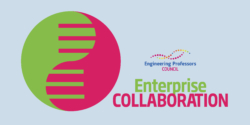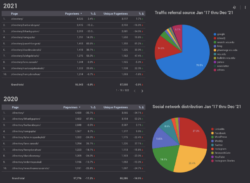 Theme: Knowledge exchange, Collaborating with industry for teaching and learning
Theme: Knowledge exchange, Collaborating with industry for teaching and learning
Authors: Deanne Taenzer (ExpertFile) and Kendra Gerlach, MBA, APR (Virginia Commonwealth University)
Keywords: Industry, Academic Expertise, Collaboration, Knowledge Exchange, Commercial Engagement, Content, Search, Discovery, Innovation, Invention
Abstract: The theme of the session is about how industry currently searches for academic expertise for applied research and other interventions. A speaker from the school of engineering and one from their partnership platform will talk about the importance of online searches and having effective academic profiles for web searches, discovery and engagement. The speakers will be: Kendra Gerlach (Director of Marketing and Communications at the Virginia Commonwealth University’s College of Engineering) and Justin Shaw (UK Development Director for ExpertFile). The university will identify specific industry engagements through their outreach via their own strategic focus and using the content development, structured data for discovery and broad reach distribution channels provided as part of their partnership with ExpertFile.
The following case study addresses, when it comes to knowledge exchange, that there is a fundamental issue in the abilities of industry to identify and source relevant academic experts and applied research centres in the first place.
The aim of the strategy covered in this case study is to determine if improved discovery via online channels and making use of relevant content has more positive outcomes for industry access and engagement with academia. We will discuss how industry searches for academic expertise for applied research, consulting and other interventions– and how the efforts of the Virginia Commonwealth University (VCU) College of Engineering improved the attraction, interest and engagement from industry and beyond.
VCU College of Engineering needs a strategy for academic expertise discovery
As a young and growing institution, VCU College of Engineering was aware that its faculty had much to offer for knowledge exchange but were almost impossible to find by potential external partners. Before adopting a strategy and partnering with the global online expert platform, ExpertFile, the College had no solution for an online academic directory that offered more than just contact and basic biographical details. A few academics already had websites for their own labs, some had up-to-date information, some included curriculum vitae. The presentation was variable and unattuned to external perspectives. Many weren’t even cited on the College’s website domain, and most were invisible to an online search.
The College recognised that there was a need to make their academics more easily findable with professional-looking content that would surface on top search engines, while also having the expertise promoted beyond the College’s website itself.
The old strategy failed to deliver
Before the College implemented a strategy focused on improved discovery and on delivering relevant and engaging content, it used traditional and digital marketing tactics that didn’t have really an anchor of information for the academic experts. Faculty relied on their own personal connections to industry and other researchers. As the College grew, it became evident that to form research partnerships and pursue large grants, faculty must be more easily found and their expertise easily accessed for academics and non-academics alike.
Putting the strategy into action
When the College pursued the strategy to increase expert visibility, many senior academics were resistant and did not want to change – as they did not fully understand the value to them and their work. The College proceeded with the adoption of professional online profiling knowing that if the strategy did not succeed, at the very least they would have current strengthened content for their showcasing academics online.
The College chose a technology platform to mobilise their strategy and modernise their market visibility – to be competitive in the engineering space. They chose to work with ExpertFile as it supported their own web presence and offered updated multimedia content formats such as videos, images and books. Beyond technology, ExpertFile’s content distribution channels (with partner promotional channels and expert-seekers) also increased content visibility beyond their own website.
With the resistance of faculty a concern, and the need for faculty to provide content for the profiles, the team adopted an initial message related to the student recruitment priority in order to get them on board (academics understood the need to be seen by potential students).
Faculty members were given their own dedicated page on the egr.vcu.edu domain. This was essential to success. Each profile has a unique, personalised url on the website so that search engines can easily find them, resulting in higher search ranking. With 93% of online sessions starting with a search engine[1], 91% of pages getting no organic search traffic from Google [2] and 75% of internet users never scroll past the first page [3] this was critical for ‘discovery’.
The unique urls also facilitated the Marketing and Communications Department to employ cross-linking, a key part to the success of the strategy. The marketing team promotes links to profiles in all content related to an academic. Every news story, award or newsletter mention includes a link. Social media uses links to drive viewers back to the website and the profile. The team have also encouraged the parent University to include links to faculty profiles whenever that person is mentioned.
VCU Engineering created a directory of profiles for the entire College members plus subdirectories for each sub-uni and department for ease of discovery. For example, a searchable subdirectory of only Computer Science faculty or Mechanical Engineering faculty which routes to that department’s homepage.
Profiles aren’t limited to biographical information and publications; they include areas of expertise, industry experience, research patents, videos, books, media and event appearances – all valued by industry and others. This content is as important as the initial discovery as it offers searchers a greater understanding of the academic expertise and its value to them.
Engaging industry benefits reputation
Industry partnerships and opportunities are an important focus of the College and academics knew that improved discovery would have widespread benefits; improving the reputation of the College and its faculty and attracting other groups – prospective graduate students, foundations, academic colleagues, associations and media.
Faculty members with strong reputations in their fields often advance in their own academic associations. For instance, one of the College’s Computer Science experts has been named president-elect of a global organisation. A nuclear engineering professor is now Director General of the World Nuclear Association. Without discovery, academics and colleges rely on their limited connections and miss these larger opportunities.
News media seeking experts struggle to find credible sources. A VCU associate professor that specialises in aerosols is now regularly featured in media and on television because he is now easily findable as an expert in this field. Media coverage has a direct lead generation impact for industry engagement and secures trust in the credibility of the source.
Many of the College’s academics have now established industry partnerships, and the marketing team knows that these efforts have contributed to those successes. From the formation of pharmaceutical clusters locally to the fastest licensing agreement done by the University, the commitment of this strategy to support those successes has paid off.
Measuring impact and results
The College uses tools like Google Analytics Studio to measure results and track progress. Since it has employed trackable pages and cross-links to the content, it has been able to record the steady progress of these efforts. Faculty have benefited from much-elevated search rankings including top-ranked faculty profiles which are viewed between 2,000 and 3,000 times a year, with more than 2,000 different visitors viewing each profile. In a given year, the College now tracks over 90,000 unique visitors that have viewed their academic profiles.

More than 70% of the views come from organic search, which means when a faculty member’s name is searched, their profile pages are among the top results, and in some cases are the number one search result.
The strategy continues to add value
Kendra Gerlach, Director of Marketing and Communications at VCU College of Engineering, and co-author of this case study reflected:
”Researchers often assess their involvement and benefit from supporting ventures on a three year cycle. If the second year is better than the first, and if the College is seeing success, they continue a third year.“
Kendra is happy to report that the College is now in year five of using ExpertFile and this expert profiling and searchability strategy.
Key Takeaways:
- Creating profile pages that live on the College’s own website domain is critical. Give academics a unique url that can impact search rankings.
- Deliberately linking to profiles from other sources: marketing materials, other organizations, social media, helps to elevate search rankings making faculty easily discovered by industry and others.
- Moving beyond academic credentials and publications to a broader array of expert content appeals to industry, making academics more approachable.
- Overcome technology limitations with platforms that integrate with current systems. If current profiles are inadequate, enhance them or use knowledge exchange focused content that can be easily discovered and acted upon.
Access summary presentation slides of this case study as a pdf document here.
Endnotes
[1] imForza, 2013, Vinny La Barbera – 8 SEO stats that are hard to ignore [2] Ahrefs, 2020, Tim Soulo – Search traffic study [3] Marketshare.hitslink.com, October 2010
Any views, thoughts, and opinions expressed herein are solely that of the author(s) and do not necessarily reflect the views, opinions, policies, or position of the Engineering Professors’ Council or the Toolkit sponsors and supporters.




